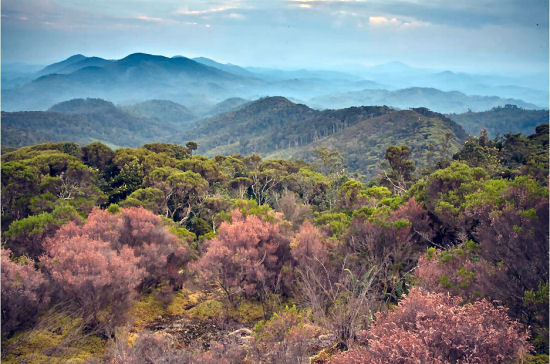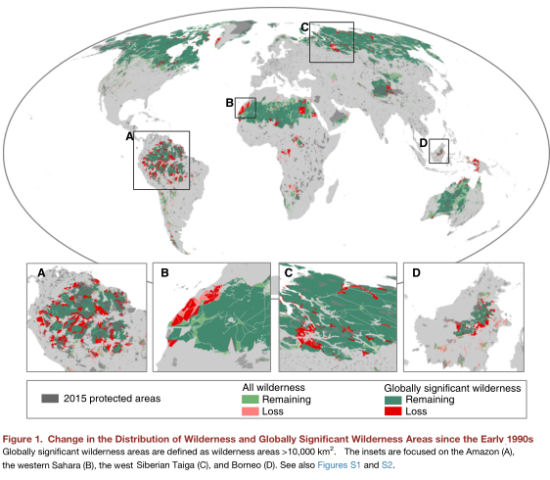 Source of illustration.
Source of illustration.
Grandiose fantasies
Grandiose fantasies about filling up a continent to create a great and powerful nation are not exclusive to Australia. Demographic hubris is alive and well in Canada too, and even now, after the loss of 20% of our best farmland to development, with more than a thousand species at risk and an immigrant population that has, over the last two decades, generated four times as much GHG emissions as the Albert Tar Sands megaproject, there are people who believe in a Big Canada concept. Irving Studin of the University of Toronto is one of them.
Five Canadians Respond to Irvin Studin’s Proposal for a Big Canada
(Sources:) http://www.ottawacitizen.com/news/todays-paper/Canada+should+100M+population+essay+says/3147990/story.html and http://www.ottawacitizen.com/technology/Challenges+100M+populace+overwhelming/3163659/story.html
"Challenges of 100M populace overwhelming," The Ottawa Citizen, June 17, 2010
REPLIES:
Re: Canada should aim for 100M in population, June 13.
Irvin Studin's vision of Canada with a population of 100 million stirs the imagination in terms of our increasing our capacity for playing a role of importance on the world stage. Unfortunately, however, what might have been possible in Wilfrid Laurier's time a century ago is no longer realistic today.
For one thing, the ecological footprint of individual Canadians is much larger now and the environmental impact of such a massive increase in population would be overwhelming.
In terms of current immigration policies, it could also be extremely costly for Canadian taxpayers -- particularly because of our generous system of social programs that did not exist 100 years ago. It is estimated that the benefits newcomers now receive already amount to tens of billions of dollars a year more than what they pay in taxes.
A third and particularly challenging problem would be the integration into Canadian society of huge numbers of people from very different cultural backgrounds. With the connections they can now maintain with their former homelands through satellite TV, the Internet, inexpensive overseas travel, etc., assimilation of large concentrations of newcomers is increasingly problematic even today.
Nor would there be significant advantages in terms of economies of scale as a result of domestic population increases since we are now very much part of a global trading community.
Cities such as Toronto and Vancouver are already struggling to cope with rapidly increasing populations due to international migration and will hardly welcome the prospect of dealing with even faster growth.
Martin Collacott,
Vancouver
Collacott is a former Canadian ambassador.
Read more: http://www.ottawacitizen.com/technology/Challenges+100M+populace+overwhelming/3163659/story.html#ixzz0rAvfb7qa
------------------------------------------------------------------------------------------------------------------------------
Saucy double entendre
While the saucy double entendre query of whether "size matters" may produce snickers from those in that frame of mind, the proposition that Canada's population should be encouraged through immigration to grow to 100 million is no laughing matter. "Size" does matter. And the consequences are profoundly far-reaching and important.
With a global population of 6.8 billion today and over 9 billion expected by 2050, what the planet - and that includes Canada, Mr Studin - does not need is more people; quite the reverse. Relentlessly expanding human numbers place ever more demands on the earth, leading to deforestation, biodiversity loss, soil exhaustion, vanishing fisheries, and increases in
greenhouse gas emissions. Typically, conflicts that dominate media headlines are caused and/or exacerbated by these and other associated resource scarcities. Today we face unprecedented global challenges including food and water shortages, a looming energy crisis and climate change, all driven by ever-expanding population increases. In Canada environmental degradation is a sad, growing fact of life. Prime farm land is being gobbled up, traffic congestion is worsening as our cities expand, and with urban sprawl air quality is deteriorating.
"Size" does matter, Mr Studin, and what we don't need is more and more people. If anything, we need fewer, since fewer translates into fewer problems, greater social justice, a better standard of living for everyone.
Look at Sweden, envied by many for its quality of life and for its outstanding role on the world stage, whether as peace keepers, aid givers (leagues ahead of Canada) and, with a population much smaller than our own, a voice in international fora that is listened to and respected as Canada's once was. Sweden's environmental record puts ours to shame. It's not
population "size" that gives Sweden its clout, any more than it is Bangladesh's 130 million that accounts for its more modest standing on the world stage. What enables Sweden to "punch above its weight" internationally is explained by factors of quality not quantity. It is those very qualities that Mr Studin and the rest of us should be addressing and not the simplistic, fallacious notion that a larger Canada would somehow automatically become a better, more influential Canada.
Clifford Garrard
VP, Population Institute of Canada
Ottawa
---------------------------------------------------------------------------------
Dear Letters Editor,
RE: Canada should aim for 100M in population, essay says, June 13
The degree to which Irvin Studin is divorced from environmental realities is breathtaking, even for an economist. If most of Canada’s vast territory were habitable, people would already be living there.
Yet satellite images of the world at night shows that most of Canada is as dark as Antarctica— because much of it is about as habitable as Antarctica. Trying to put large numbers of people into such an environment would require tremendous expenditures of energy (transport of food, heating of homes etc) and result in a concomitant increase in our greenhouse gas production.
Most newcomers to Canada settle in Toronto, Vancouver, and Montreal, and only a handful settle outside the 12 largest urban centres. Our large cities are already bursting at the seams with increasing congestion and smog and ever more stressed infrastructure, and have trouble dealing with their own wastes. Only about 5% of Canada’s land surface is classified as dependable agricultural land. Due to the massive population increases of recent decades, urban uses now cover
14,300 square km of dependable agricultural land. How smart is it to destroy one’s own food security?
There have been at least three reports that specifically looked at population growth in Canada from an environmental perspective (Science Council of Canada Report No. 25 in 1976; a now declassified confidential report to the Privy Council in 1991 called The environment: marriage between earth and mankind; the Healey report of
1997 on the ecosystems of the Fraser River). All documented the stress that population growth is putting on Canada’s agricultural land and ecosystems. The collapse of the cod fishery and the recent spectacularly poor run of salmon in the Fraser River support their conclusions.
In terms of consumption of resources, greenhouse gas production, and stress on agricultural land and ecosystems, Canada is already overpopulated.
Sincerely,
Madeline Weld President, Population Institute of Canada
--------------------------------------------------------------------------
Dear Letters Editor,
Re: Ian MacLeod - aim for 100 million
"At 100 million, this is among the most powerful and important countries in the world. And the world will takenotice." Phrased another way, "the sun never sets on the British Empire" or "the beginning of a 1000 yearReich".
Given the environmental and economic issues looming in this century, it is doubtful the world will take positivenotice of Canada's continuing on its current path of being the worst performer in carbon emissions of theKyoto 58 signatories save Saudi Arabia. Nor will our second worst per capita income growth in the developedworld over the past 4 decades draw much applause.
We are already taking ridicule from all sides for our worst-in-the-developed-world environmental performance andwe get singled out regularly on our poverty and productivity levels. Both of these failures are driven primarily byour policy of mass immigration, again, the highest in the world over the past 40 years.
In this century, the world will be looking to countries of whatever size which can deliver solutions notjingoistic slogans and fantasies of empire from a bygone era.
Yours truly, John Meyer
---------------------------------------------------------------------------------------------------------------------------------------
How to make Canada "Big"
Letters editor, Ottawa Citizen
So Irvin Studin believes that by becoming a nation of 100 million people through immigration, Canada would becomea big player on the world stage. (Citizen June 13/2010)
http://www.ottawacitizen.com/news/todays-paper/Canada+should+100M+population+essay+says/3147990/story.html
Presently some 80 per cent of New Canadians lack the skills necessary to earn an income high enough to pay enoughtaxes to reimburse government for the services they consume. In fact, Professor Herb Grubel of Simon FraserUniversity estimated that by 2002 the cohort of immigrants who came in 1990 were imposing a staggering netcost of $18 billion a year. No doubt that figure would be much higher today.
Here's a thought. Rather than importing this fiscal burden, we take the 18 plus billion dollars that would havespent on immigration, and deploy it instead to development aid in developing countries made conditional onfamily planning. In that way we could help people where they are helped best---at home where they live, andthereby alleviate the conditions that motivate them to leave----the competition for land, water, food and otherresources made scarce by overpopulation. Imagine what clout and status such a policy would bring to Canada.Not only would we meet the UN target of spending 0.7 per cent of our GDP on foreign aid, we over-achieve itby leaps and bounds and set an example for the rest of the world. And by doing so, we would also provide neededrespite to our prime farmland and endangered species habitat that have been bulldozed at an alarming rate tobuild housing for our runaway immigrant-driven population growth--- already the highest of G8 countries. A win-win proposition all around.
Forget the demographic ego-trip, Mr Studin. That is how to make Canada big and influential.
Tim Murray VP Biodiversity First
 A University of Queensland-led international study released today reports catastrophic declines in wilderness areas around the world over the past 20 years. UQ School of Geography, Planning and Environmental Management and Wildlife Conservation Society in New York researcher Associate Professor James Watson said findings demonstrated alarming losses comprising a 10th of global wilderness since the 1990s. The report discovered that a total of 30.1 million km2 (or 23.2% of terrestrial areas) of the world’s land area now remains as wilderness, with the majority located in North America, North Asia, North Africa, and the Australian continent. An estimated 3.3 million km2 has been lost since the early 1990s (approximately a 9.6% loss in two decades, with the most loss occurring in South America (experiencing 29.6% loss) and Africa (experiencing 14% loss). [1]
A University of Queensland-led international study released today reports catastrophic declines in wilderness areas around the world over the past 20 years. UQ School of Geography, Planning and Environmental Management and Wildlife Conservation Society in New York researcher Associate Professor James Watson said findings demonstrated alarming losses comprising a 10th of global wilderness since the 1990s. The report discovered that a total of 30.1 million km2 (or 23.2% of terrestrial areas) of the world’s land area now remains as wilderness, with the majority located in North America, North Asia, North Africa, and the Australian continent. An estimated 3.3 million km2 has been lost since the early 1990s (approximately a 9.6% loss in two decades, with the most loss occurring in South America (experiencing 29.6% loss) and Africa (experiencing 14% loss). [1]




Recent comments